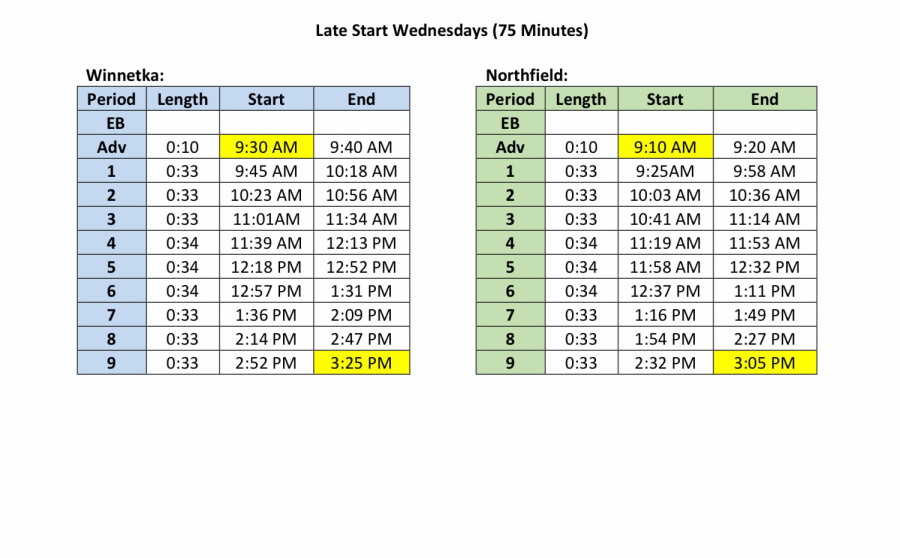Late start proposal rejected after student and staff pushback
Early bird classes, lab days, and long weekends lead list of priorities
The recent decision not to implement weekly Wednesday late arrivals for the 2019-2020 school year has been a complicated topic between parents, students, and staff, and the school board. According to Superintendent Dr. Paul Sally, there was not a consensus for or against late starts in any one group.
The follow up email addressed New Trier families and discussed how “the proposal also raised concerns about issues such as transportation to school, disrupting the consistency of student and family schedules, and loss of instructional time.”
While these are major concerns, Sally assured that these issues would be resolved in the transition to a new schedule. Students were not so worried.
Junior Kaeleigh Flannagan said, “I want late starts, and I couldn’t care less about losing ten minutes from class.”
Sally was surprised by the priority students placed on the current Friday schedule with no double period lab in science classes.
Early bird biology teacher Brian Woodruff said, “Most early bird teachers were concerned how this would affect the continuity of the class.”
Early bird science classes would haveonly run two days in a row, interrupted by late start Wednesdays and weekends. The solution to add fifteen minutes onto early classes created the problem of too long of classes.
“You can only absorb so much information in a class period,” said Woodruff.
The administration took careful consideration of the rhythm of the week, especially with students’ use of the extra free period on Friday.
With the current schedule, students use early release Friday and late start Monday weekends to visit colleges, Sally said. The block of time off helps them stay on top of school by missing only half their classes to go out of town.
One of the most prominent goals of weekly late arrivals was to help manage student stress.
The initial email sent out to parents with the proposed calendar listed “extra sleep or schoolwork” as possible uses for the extra 75 minutes on Wednesday mornings.
The shared morning time scheduled for teachers to collaborate would have been helpful, but Sally emphasized that the staff will continue to find other times to meet.
In a followup email about the feedback surrounding weekly late starts, Sally detailed that the final schedule will include one more early dismissal and late start weekend, several homework-free breaks, and “more professional development time in the school day for faculty.”
Throughout the planning process, the calendar committee considered scheduling a 90 minute late start every week next year, but this plan did not make it to the proposal stage because further reducing class time would impact classes more, according to Sally.
While they wouldn’t consider the same solution, the administration plans to take time to put a more comprehensive solution together with the Strategic Planning Committee, while maintaining the opportunities that early bird and a nine period schedule provide.
Still, Sally emphasized the need for the administration to help students manage & balance their lives.
In support of weekly late starts, Flannagan mentioned that students with Saturday morning sports rarely get to sleep in, and “it feels like a short week when there’s a break in the middle.”
When the proposal was not passed, some students were disappointed to lose the prospect of an extra hour and a half to sleep in every week.
In a New York Times article, a study by The American Academy of Sleep Medicine revealed that three out of four high school students do not meet the recommended eight hour minimum of sleep. The same health organization suggested that high schools (and middle schools) do not start earlier than 8:30.
As an early bird science student, junior Janey Matejka said sleeping in one hour a week is significant. “It’s the difference between six AM versus seven AM.”
Matejka expressed, “I would one hundred percent not mind losing the late start and early release days if it meant sleeping in one day a week.”
On the other hand, junior Karl Florida reasoned that for students who take early bird and those who do not, the schedule would mess up labs on Fridays. “In general the late start doesn’t make sense logistically, he said.”
While other options to achieve the benefits of the late start proposal without the scheduling hassle exist, the administration is not willing to change certain traditions, like sacrificing daily advisery, which “brings so many benefits to so many kids and to the whole structure of the school,” said Sally.
Ultimately, like the first day, breaks, and other dates on the school calendar, the schedule is not up to students. However, after receiving such strong negative feedback (especially from early bird students and teachers), Sally said this particular late start Wednesday plan will not be considered again.
In response to the advisery assembly to discuss the decision against weekly late arrival, senior Alanna Goldstein said the Student Alliance President, Bill Yen, referenced the survey which showed overwhelming student support of late starts and informed students that the school would like to implement weekly late starts in the future.
“Parent and teacher concerns delayed the prodigal for next year. I personally think that the students who are in favor of the late starts tend to be younger so they haven’t had the opportunity to do early bird classes which would be severely limited under the late start proposal,” said Goldstein.
Overall, Sally said, “we really appreciated the process and the input from everybody. People were involved and voiced their opinions, and that’s powerful for a community.”








































